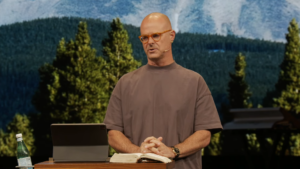Some betrayals shout through microphones, others whisper through Magnolia wreaths. This one came wrapped in warm wood tones and Instagram filters, served not with the clash of symbols but the hum of fiddle strings over a Sunday night television spot. The Gaines betrayal wasn’t announced—it was curated.
For years, Chip and Joanna Gaines occupied the sanctified space between Bible verses and backsplash tile. They were the avatar of Christian respectability—evangelicals who dressed the gospel in denim jackets and antique signage. They made the idea of faith fashionable, not by preaching repentance, but by staging it in a perfectly lit Texas kitchen with just the right number of distressed candlesticks. They were the anti-Kardashians—wholesome, Christian, middle-America affirming—but they understood their brand as deeply and shrewdly as any Hollywood mogul. Their rise was not accidental. It was a masterclass in demographic seduction.
But branding is not belief. And this past week, the scaffolding cracked.
Protestia had the integrity to say the quiet part aloud. They broke the story that Chip and Joanna’s new show, Back to the Frontier, executive-produced for HBO Max, features a central narrative family comprised of two men and their adopted children. Not a blink-and-you’ll-miss-it cameo. Not a token appearance. A deliberately featured, front-and-center storyline—a sodomy-based family recast as frontier moral exemplar.
The show’s concept is spiritual cosplay: families are plucked from their screen-addled comfort zones and tossed into 1881, a time before Wi-Fi, climate control, and Twitter theology. The premise is marketed as wholesome—eight weeks of simulated hardship to instill character, unity, and maybe even a sense of gratitude. But beneath the sepia-tone nostalgia lies a deliberate reordering of moral categories. This is not a return to the old ways. It is an overwrite of them.
Let us not pretend: this was not an accident. It was not forced upon them by network tyrants or imposed by unavoidable cultural winds. This was a selection. A deliberate, strategic, market-calculated selection. Of all the thousands of families desperate to be featured, they chose this one. And with that decision, the Gaineses declared war—not just on Christian tradition, but on truth itself.
FROM MAGNOLIA TO *AGNOLIA
Chip and Joanna have long performed the pas de deux of evangelical ambiguity. They attended Antioch Community Church, where biblical fidelity was once preached. They invoked God often, if vaguely. They marketed morality without dogma, and it worked precisely because it was non-threatening. They never rebuked sin—they remodeled around it. But now, for the first time, the ambiguity is gone. They have crossed the threshold. This isn’t silence. It’s celebration.
And for those tempted to call it mere representation—spare us. Platforming is pedagogy. Featuring is affirmation. To place this couple in the moral center of your narrative is not passive—it is didactic. It teaches. It blesses. It catechizes. No one casts a same-sex couple as protagonists in a period piece set in 1881 without intending to make a statement. And make one they did.
This is not cultural reflection. It is cultural engineering. Christians are expected to believe this was an innocent nod to diversity—just another family on the prairie. But only fools swallow such spin. This was a calculated act of ideological smuggling. A rainbow flag flying beneath a weathered American one. A sacrilege served in antique china.
And it happened just as the secular tide is turning. Bud Light tanked. Target tripped. Parents are revolting against rainbow curricula and genital theory in kindergarten. The public, increasingly, has had enough. But right when the world is waking up to the grotesque overreach of the LGBTQ theocracy, the Gaineses—our would-be Waco saints—decided to be the last people to board the ark of delusion.
This is the precise moment Protestia seized. No one else dared say it. Not Relevant, not Christianity Today, not any of the legacy gatekeepers busy adjusting their pronouns and diversity quotas. But Protestia saw through the soft-lit heresy and named it for what it is. Betrayal. Treachery. Apostasy. And not the accidental kind, but the artisanal kind—handcrafted in Waco, framed in a distressed wood sign, and sold to the saints for $29.95.
FROM SHIPLAP TO SODOMY
This was always the endpoint. You can only sell a gospel of vibes and vaguely inspirational quotes for so long before the demand for clarity knocks. And when that knock came, the Gaineses answered—not with conviction, but with compromise.
This is how cultural decay creeps into the Church—not through howling rebellion, but through curated cowardice. Through the charming couple who builds a kingdom on Scripture-themed wallpaper, only to empty the Scripture from within. They still speak of grace, but it’s a grace that saves no one. They still invoke love, but it’s a love that never corrects. They still talk about God, but He is a stylized accessory now, a rustic mantlepiece in the religion of aesthetic inclusivity.
The show was pitched as a spiritual journey through hardship. But how can there be sanctification where there is no sin? What kind of formation is possible when you start by calling darkness light? There is no character growth in a story that canonizes confusion. There is no redemptive arc in a drama where rebellion wears the hero’s hat.
It is, in every sense, a gospel of another kind.

So Protestia stood up. While others re-shared the trailer or offered breathless praise for its production value, Protestia said what needed saying. This is not representation. It is indoctrination. This is not inclusion. It is inversion. And Christians who still believe that the Word of God speaks with clarity on the nature of man, the design of family, and the ethics of sexual conduct must reject it with the full force of their spiritual inheritance.
Because what Chip and Joanna have done is not merely disappointing. It is not a lapse. It is not a stumble. It is a strategic, branding-conscious, revenue-driven embrace of moral inversion. It is what happens when the gospel becomes a set piece in a lifestyle brand—when Christ is no longer the cornerstone, but the coffee table book.
The Gaineses are not just reality TV stars. They are moral architects. Cultural catechists. And like all builders, they have laid a foundation. But it is not on Christ. It is not on the apostles and prophets. It is built on the unstable ground of public sentiment and the hollow applause of those who hate the God they once claimed to serve.
Chip and Joanna built a house. But Christ told us what happens to houses built on sand. The winds are coming. The rain is falling. And the crash will be great.
THE BACKLASH: CHIP GAINES ATTACKS BIBLICAL CHRISTIANS
It didn’t take long. The moment Protestia broke the story and faithful Christians began asking hard questions, Chip Gaines hit the big red button marked “blame the believers.” And like clockwork, the betrayal doubled down—not just by featuring and platforming a same-sex couple, but by turning on the very people who dared to object.
Chip Gaines didn’t respond with humility. He didn’t clarify. He didn’t explain. He didn’t walk anything back. Instead, he aimed the barrel squarely at the flock that had supported his empire and pulled the trigger on social media. From the cozy battlements of his multimillion-dollar platform, Chip went full crusader—only not against the world, not against sin, not against compromise—but against Christians.
His tweet was nothing short of contempt masked as virtue. Here’s what he posted to X:
“Talk, ask questions, listen.. maybe even learn. Too much to ask of modern American Christian culture. Judge 1st, understand later/never.
It’s a sad Sunday when ‘non-believers’ have never been confronted with hate or vitriol until they are introduced to a modern American Christian.”
And there it is. The blood libel against the Church, rebranded for 2025 and packaged by a man who once quoted Scripture while installing shiplap. In one fell swoop, Chip managed to echo every tired slander of biblical Christianity mouthed by bitter exvangelicals, liberal seminary dropouts, and blue-haired apostates who think Leviticus is a hate crime.

Let’s be crystal clear: when Chip says “modern American Christian,” he’s not talking about rainbow-flag-flying United Methodists or Episcopal drag queen liturgists. He’s not talking about the faux-pious deconstruction crowd or the “Jesus was a socialist” TikTok influencers. No, he’s talking about you. He’s talking about the mom in Missouri who gave up Target because they put chest-binders in the kids’ section. He’s talking about the plumber in Tulsa who canceled Disney+ because of their grooming agenda. He’s talking about Protestia readers. He’s talking about the Christians who built his brand by trusting that the gospel meant something more than home renovation metaphors.
And how does he reward that trust? With a rebuke.
It’s the oldest play in the evangelical celebrity manual: betray the faithful, then accuse them of being mean. Make a deal with the world, then gasp in horror when anyone points out that you sold your soul for a streaming slot. Step on the Bible to climb higher in Hollywood’s good graces, then snarl at the very people holding that Bible in their lap on Sunday morning. Chip didn’t just tolerate sin. He went out of his way to scold those who still have the spine to call it sin
And it gets worse. His message wasn’t a lament—it was a calculated narrative. He wasn’t heartbroken over division. He was condemning. He was preaching a new gospel, one where the only sin is calling sin by its name. In his rebranded Beatitudes, “blessed are the platformed,” and “cursed are the Christians who ask why.”
This is what apostasy looks like in the age of PR. It’s not a public renunciation—it’s a veiled accusation. The new Judas doesn’t throw the silver coins; he invests them in a content studio and tweets out a passive-aggressive indictment of the faithful. He looks into the camera with warm eyes and a soft grin, then proceeds to punch the Bride of Christ square in the jaw. All in the name of “love.”
And while Chip was busy slandering the saints, the world applauded. Of course they did. Because the world always claps for the tame Christian who turns his back on the others. The world doesn’t hate religion—it hates conviction. And when someone like Chip Gaines proves he’s willing to walk away from conviction for the sake of optics, the world opens its arms and gives him a standing ovation. For now.
But God doesn’t clap for cowards.
And neither should we.
It was in that spirit that I responded from my account @LostMyHats—not with fawning sentimentality or soft-shoe piety, but with a line that cuts through the fog:
“I’m pretty sure the ones extolling the virtue of sodomy-based marriages are the so-called ‘modern American Christian.’”
Because let’s get something straight: the ones affirming perversion, legitimizing unnatural unions, and softening the gospel to avoid friction are not the enemies of the world—they are its handmaidens. It’s not the culture that’s infiltrating the church anymore; it’s the church volunteering to be annexed. With open arms. And branded throw pillows.
So no, Chip. We are not the ones bringing hate and vitriol. We’re the ones bringing clarity. We’re the ones standing where you used to claim you stood. We’re the ones refusing to pretend that sodomy is family, that rebellion is courage, and that platforming sin is just “diversity.” We’re not confused. You are.
And here’s the great irony of it all. Chip calls Christians judgmental. He accuses them of failing to listen. And yet, when confronted with real concerns from the very people who gave him everything—our money, our support, our trust—he didn’t listen. He lashed out. He didn’t pause to reflect. He preached a self-righteous sermon on X and declared himself holier than thou for clapping a gay couple on the back and kicking Bible-believers in the teeth.
The man who once said he hears God in the breeze now hears Him, apparently, in HBO casting calls and affirming tweets from secular media. How convenient.
But there’s still time. He could repent. He could walk it back. He could acknowledge that he went too far. That he overstepped. That, in a moment of desperation to please the world, he alienated the Kingdom. He could renounce this charade, return to the faith he once claimed, and say without stammer or PR coaching: we were wrong. This was sin. We cannot support it, feature it, or give it a place of honor.
But that would require courage. That would require humility. That would require the fear of God—a quality noticeably absent from most Christian influencers once they’ve tasted the adoration of the crowd.
So don’t hold your breath. Don’t wait for a retraction. Don’t expect a reversal. Instead, expect more of the same. More virtue-signaling. More rebukes of “toxic” Christians. More applause from people who hate the Bible and hate Christ but love a good aesthetic. And, of course, more silence from the rest of evangelicalism, which will continue to give the Gaineses a pass because of their charming smiles and rustic authenticity.
BRANDING, BETRAYAL, AND BULLCRAP
So then, let’s dispense with childish notions. This was never about a single casting decision. It was never about a family on a reality show. It was never even about Chip and Joanna Gaines, not really. This is about the endgame of evangelical capitalism—a machine that converts conviction into content, doctrine into décor, and Christ into a lifestyle brand to be monetized, curated, and sold by the square foot. What we are witnessing is not a tragedy of miscalculation. It is the logical conclusion of Christian branding divorced from biblical backbone.
Chip and Joanna did not trip into apostasy. They rebranded into it. This was the inevitable conclusion of an empire built not on Scripture but on sentimentality. You don’t get to build a multi-million-dollar empire on vague spirituality, partner with HBO, and retain your orthodoxy. That’s not how this works. That’s not how any of this works. You cannot serve both Yahweh and Hollywood. You will either be crucified by the world or courted by it—but never both.
THE CURRENCY OF COMPROMISE
The Gaineses have always been brilliant marketers. They mastered the Christian aesthetic while draining it of theological content. They weren’t just decorators of homes—they were decorators of the faith. They painted crosses over hollow spaces and called it testimony. And Christians bought it. We bought it all. We filled their coffers and their social capital accounts because they smiled, talked about prayer, and wore plaid. We confused moral vibes with moral clarity.
But branding is a false gospel. It does not sanctify; it sanitizes. It reduces the blood-soaked call to die to self into a seasonal trend board. It turns martyrs into motivational posters and prophets into Pinterest quotes. It strips the rugged cross of its offense and replaces it with tasteful ambiguity. And once Christianity becomes a commodity, it is only a matter of time before it conforms to consumer demand. That demand, in our age, is simple: conform or be cast out. Normalize rebellion. Platform perversion. And whatever you do, make it look beautiful.
So they did. They took the rainbow revolution and dipped it in chalk paint. They made Romans 1 palatable to the Peloton crowd. They sanctified sin with shiplap. They took an abomination and upholstered it in burlap, then asked us to applaud.
What happened with Back to the Frontier is not an aberration. It is the final unveiling. The curtain has been pulled back, and we see the priests of brand and influence swinging their censers not before the altar of Christ, but before the altar of relevance. The Gaineses are not alone. They are simply the latest celebrity missionaries of the spirit of the age, sent not to proclaim, but to appease. Their gospel has no teeth. Their Christ carries no sword. Their theology is as hollow as the hollow-core doors they once installed for a ratings bump.
This is not mere drift. This is cheerful apostasy. This is the strategic commodification of sin for cultural currency. This is gospel inversion disguised as down-home hospitality. And it is damnable.
Their transformation also reflects a systemic failure—one built into the bones of American evangelical culture. The expectation that celebrity and Christianity can harmoniously coexist without compromise is a fantasy, one that has long since passed its expiration date. We have allowed charisma to replace character, influence to replace integrity, and relevance to replace reverence. We have taught an entire generation to value platform over principle. The Gaineses are merely the logical fruit of a poisoned tree.
THE CHURCH IS THE LAST TO WAKE
And oh, the tragic irony: just as the secular world begins to experience rainbow fatigue, just as Bud Light craters, just as parents revolt against the madness of drag pedagogy and trans athletes, just as the cultural tide begins to turn—who shows up with glitter and glue to bedazzle the altar of Baal? Evangelicals.
While the world says, “Enough,” the Church says, “It’s our turn!” Just as the idols are starting to fall under their own weight, Chip and Joanna rush in with duct tape and devotionals. The marketplace begins to question the spell, and our influencers rush to reinforce it.
It would be comedic if it weren’t so catastrophically sad. It is the theological equivalent of marching into Chernobyl after the meltdown, clutching a tea towel and a fixer-upper guide. “Don’t worry,” say the Gaineses, “we’ll make fallout look like a feature wall.”
This is the condition of modern evangelicalism. We are not the vanguard. We are the lagging tail, always late to conviction, always on time for compromise. We baptize what the world is now abandoning. We build cathedrals to trends already trending down. And then we wonder why no one takes our faith seriously.
We are the caboose of the culture train, pretending to be the engine. And the worst part is—we like it this way. We like the comfort. We like the applause. We like being liked. And for the price of being adored by a dying world, we will sell the Savior who died to redeem it.
THE WAGES OF INFLUENCE
Understand this: the Gaineses are not being punished by the world for their faith. They are being rewarded for their surrender. This is the reward. This is what it looks like when you give the devil your backbone and he gives you a content deal. This is what it means to gain the world and lose your soul—but make it cozy.
This is why their betrayal cuts so deeply. Because it wasn’t just capitulation. It was camouflage. It was done with a smile and a scripture and a faux-rustic font. They didn’t just walk away from truth. They walked away slowly, in soft lighting, with acoustic guitar music playing in the background, and they invited the rest of us to come along.
And many will follow. Many already are. Pastors will cite them. Christian influencers will link to their show. Bookstores will restock their products. Youth pastors will use their home as sermon illustrations. This is how apostasy spreads in the age of aesthetic orthodoxy—not through persecution, but through Pinterest.
But we won’t.
We will not join them in this stylized apostasy. We will not trade our confession for curation. We will not allow moral inversion to be baptized in the name of hospitality. We are not here to make sin feel safe. We are here to make Christ known—and He does not share His glory with HBO.
We must come to terms with this reality: in every generation, there will be those who betray Christ for silver. Today, the silver comes in the form of Instagram followers, exclusive contracts, and glowing write-ups in progressive media. But the price is the same. And the blood on the floor still cries out.
THE FIRE NEXT TIME
And so, the reckoning must come. Not just for the Gaineses, but for the entire edifice of celebrity evangelicalism that allowed this farce to metastasize. We must burn down our shrines to platform and personality. We must salt the ground where we once erected idols of charm and relatability. We must return to the terrifying, untamed Christ who braided a whip and cleansed the temple.
Because the truth is this: Chip and Joanna are not unique. They are exemplary. They are exactly what our lukewarm culture demanded and exactly what the institutional church supplied. And until we stop tolerating these soft betrayals, they will keep coming. One platform at a time. One rainbow cameo at a time. One show at a time.
But the Church belongs to Christ. And Christ is not a brand.
He does not sell mugs. He does not sell throw pillows. He does not affirm sin. And He most certainly does not executive produce heresy.
























3 responses to “Sodom and Shiplap: How Chip and Joanna Gaines Sold Out Jesus”
Who would want to be Crew, Chip and Joanna’s young son? Will he be sent over to play with the kids who have the two dads? Will Crew be told all is well and to look upon those Sodomites the same as he would dear mom and dad? Will the Gaineses be assured their little son won’t be sodomized? How absolutely disgusting and sordid! Chip might as well “go fishing” with those guys. I’m sure Joanna will be just fine with it.
They went woke a while ago, but were not yet brazen enough to feature it, until now.
Judas at least returned the money; Chip and Joanna used their betrayal to fatten their bank account. And no we do not hate these men; our hearts are broken, and we pray for their repentance. The haters are those who affirm them and are helping them to go to hell.